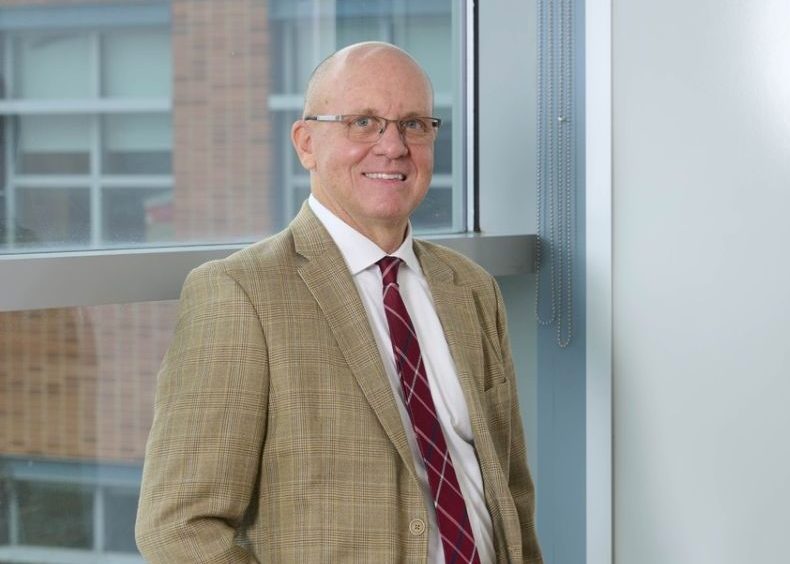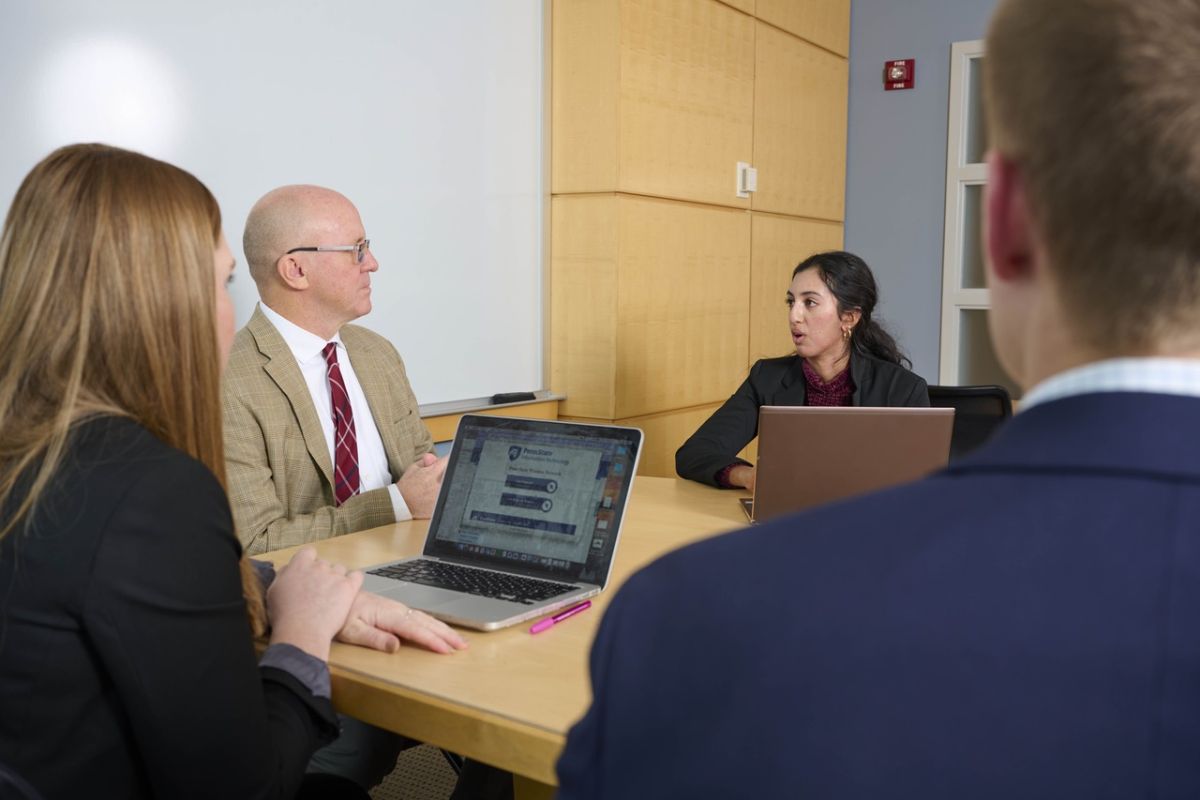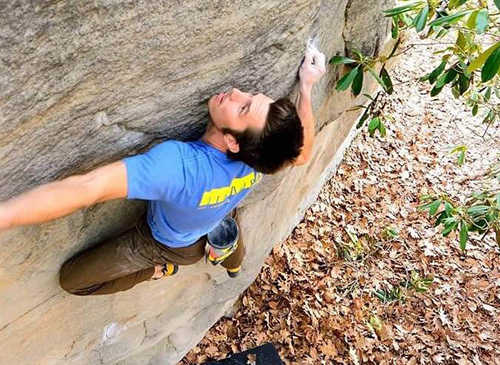By Eric Erickson

Farrell Center participants discuss entrepreneurship with director Dr. Shawn Clark. Photo: Provided.
When students enter business school, they often find the experience entails mostly classroom-based theory and little hands-on experience. Penn State University’s Farrell Center for Corporate Innovation and Entrepreneurship has made it a mission to change this dynamic.
The Farrell Center was founded in 1992 with an endowment from Michael J. Farrell, president and chief executive officer of Farrell and Company, an investment banking firm specializing in manufacturing. The generous award allowed the center to go from concept to reality and bring Farrell’s vision of promoting and supporting entrepreneurship and innovation to life.
“When I created the center, I wanted there to be a place at Penn State where students were taught how to build a business plan,” the late Farrell explained. “And I wanted them to see the practical side, not just what you could read in a book, about starting their own business.”
Aligning with this goal, the Farrell Center creates and manages a number of educational programs in corporate innovation and entrepreneurship and provides research and outreach to current students and alumni, as well as those in the business and entrepreneur community both locally and nationwide.

Farrell Center for Innovation and Entrepreneurship Director Dr. Shawn Clark. Photo: Provided.
Supporting students, startups and alumni
Farrell Center director Shawn Clark, who teaches management consulting and innovation classes in Penn State’s Smeal College of Business, explained that the diversity of those who work with the center, as well as the diversity among students, is where its true strength lies.
“It’s an organic soup for really wonderful things to happen,” Clark said. “Creative thinking comes from interdisciplinary experiences because they have the language of these different professions.”
Clark added that the center allows students to dive in and learn not only how the business world works, but how entrepreneurship can be an entirely different experience. One of the goals of the center is to prepare students for the reality of business and expose them to the fact that there will be hard times and failures, as well as successes, and to be ready for both.
“We educate them so they can survive in a corporate setting,” Clark said. “When it’s hands-on it has social and business impact. Everyone gets excited.”
A particularly unique aspect of the center is how it provides faculty-led student consulting teams to companies through several of its programs. This aspect is especially useful to startups that encounter problems as they navigate the search for seed capital and conduct initial market research. The school runs 10-20 consulting projects a year and offers a way for companies to acquire free services, while students gain real-world experience. The length of the assignments varies from 15 weeks to a full year.
“It’s an organic soup for really wonderful things to happen,” Clark said. “Creative thinking comes from interdisciplinary experiences because they have the language of these different professions.”
The Farrell Center also boasts its own Garber Venture Capital Fund, established in 1999 via an endowment from Dr. John Garber and his wife Bette. Currently valued at about $1.5 million, the fund has invested in nearly 30 companies since its creation and is one of the country’s largest student-centric funds. Investing approximately $150,000 a year, the Garber Fund uses second-year MBA students from an entrepreneurial finance class to make decisions on investments. Instructor Steve Carpenter is a full-time venture capitalist and brings his knowledge to the classroom, so students can learn from his real-world experience.
After applying to the fund, entrepreneurs pitch their ideas to the students, who then select the projects they believe deserve consideration. During a seven-week course, the students form teams and research the companies and their viability for an investment opportunity. These choices are presented to their peers and they vote on which companies, if any, will receive funding.
Helping startups grow through student involvement
Companies and alumni alike, from all over the country, call on the center and its students for assistance, whether through the consulting program or venture fund, or just the center’s connections.
Clark recalled a company in Utah that was in search of help with supply chain research as it created a business proposal for potential investors for a micro-nuclear reactor. Another company seeking help was a small Pennsylvania startup creating battery packs and looking for new vendors so it could expand.
“People call us and say I’m having trouble with X, Y and Z, do you know anybody in this industry; we’ll help make those connections,” Clark said.
“Almost immediately, Shawn connected me to about half a dozen people, from potential investors to advisors to people who just understand the startup world well, and it was extremely helpful,” Buday recalled.
One of those people was Diane Velona, CEO of New Jersey-based The Velona Group. The startup is currently using Farrell Center students to research The Velona Group’s alternate education funding project, a concept that allows people to invest in tuition shares, almost like investing in a company. Families and potential students can save for the future while providing educational institutions with capital in the present. Holders of the educational shares will even be able to sell them on a market if their future plans change, allowing others to take advantage of the shares.
“I actually stumbled across it,” Velona laughed, explaining she was looking into seminars when she learned about the Farrell Center programs. “I decided, why not?”
Velona reached out to Clark who immediately responded back to her. The CEO attended a Farrell conference and met with Clark and other staff and students, and was sold on the approach of using students to conduct research for her project.
“It’s going well,” Velona said. “There are definitely benefits for an entrepreneur to sign up.”
Five students are currently working to research different aspects of Velona’s project including viability and how to get the word out about the potential business. Some students are looking into social media representation, as well as alumni opportunities. The project will last through the fall term, at which time Velona will receive data and other deliverables. Velona has found the students to be knowledgeable and eager.

Farrell Center participants discuss entrepreneurship with director Dr. Shawn Clark. Photo: Provided.
“It’s very helpful to have all of these extra hands as an early startup,” she said.
Even those with experience in corporate culture have been impressed with the center and its approach. Tom Buday, a former executive with Nestlé and a Penn State graduate, joined the clean energy startup Emission Free Generators as co-CEO and was surprised by how difficult it is to make connections compared to his time at the Fortune 500 food and beverage company.
“It struck me pretty quickly that the startup world is a different kettle of fish from the large corporate world,” the Southern California-based Buday said, explaining that often his calls aren’t returned and that promises weren’t kept. “The startup world is a whole different game.”
While working to gain a foothold for the new company, Buday reconnected with Clark, whom he had met in the past.
“Almost immediately, Shawn connected me to about half a dozen people, from potential investors to advisors to people who just understand the startup world well, and it was extremely helpful,” Buday recalled.
While Buday and Emission Free Generators are still in the early stage of their relationship with the Farrell Center, he is happy with how it’s gone so far. As a Penn State alumnus, Buday also acknowledged it’s great to see how graduates are helping each other and to see the next generation of business leaders coming out of the university.
“I would not hesitate to recommend Shawn and the center highly to anybody who is in my situation,” Buday said.
For more information: https://www.smeal.psu.edu/fcfe/.






